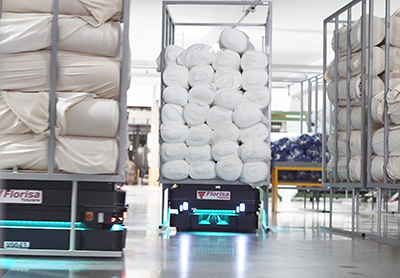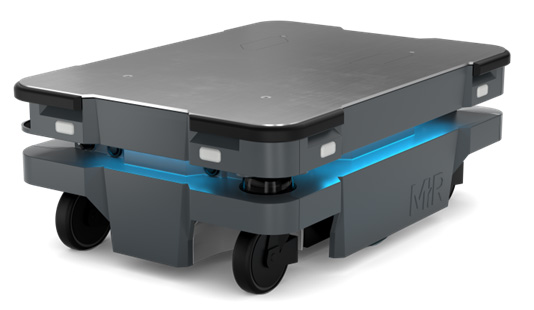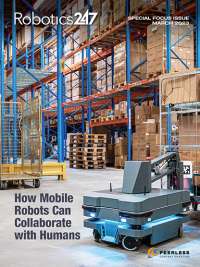Mobile Industrial Robots ApS today said that its sales for the first quarter of 2021 increased by 55% over the same period last year. The Odense, Denmark-based company noted that much of its Q1 sales were of the MiR250, its latest and most compact autonomous mobile robot. It also said that it has received multiple orders from multinational organizations that are continuing to invest in large fleets of robots to automate materials handling and internal logistics.
“Automation and digitalization are critical measures to strengthen manufacturing businesses during and after the COVID-19 pandemic,” stated Søren E. Nielsen, president of Mobile Industrial Robots (MiR). “Consequently, many companies that successfully tested AMR solutions are returning for more and planning full-scale deployments of up to 50 robots to improve internal logistics and efficiency and enable their workers to focus on higher-value tasks.”
Founded in 2013, Mobile Industrial Robots has developed and marketed collaborative autonomous mobile robots (AMRs). The company's customers include hundreds of midsize to large manufacturers and logistics centers such as Novo Nordisk, Ford, and Honeywell, as well as several hospitals. MiR has a distribution network in more than 60 countries.
In 2018, automated test equipment supplier Teradyne Inc. acquired Mobile Industrial Robots. Reading, Mass.-based Teradyne also owns AutoGuide Mobile Robots, Energid Technologies, and Universal Robots. Teradyne this week reported Q1 2021 revenue of $782 million, with $80 million in industrial automation.
MiR credits demand in logistics, healthcare
Mobile Industrial Robots said its Q1 orders demonstrate that automotive and electronics companies are continuing to automate internal transport. Mobile robots are also widely used in the consumer packaged goods (CPG) sector, the pharmaceutical industry, and logistics, it said.
MiR added that the global pandemic has propelled the development and growth of cleaning modules for its robots as they are deployed to disinfect offices, hospitals, and other public spaces.
In addition, MiR attributed its sales growth to increased interest by technology manufacturers in integrating MiR robots with their products to make their automation mobile and flexible. For example, KEN Hygiene Systems has used MiR robots to automate the filling and emptying of washer disinfectors in sterile centers in hospitals.
Investing in fleet management software, customer service
Mobile Industrial Robots acknowledged that the mobile robot market has become much more competitive since it launched the MiR100, its first collaborative AMR, in 2015. The company said it is investing in quality, product maturity, and global customer service across its entire fleet.
MiR noted that the largest percentage of its Q1 orders was for the MiR250, which can carry up to 250 kg (551 lb.) and move at 2 m/s (4.4 mph).
“The maturity of the technology in MiR’s robots means that our robots can solve more and more trivial, grueling, or dangerous tasks,” said Nielsen.
“Robustness, agility, and safety features make the MiR250 exactly what dynamic production and logistics environments need as companies strive to succeed in a competitive business landscape,” he said. “To ensure our customers can capitalize on all of the benefits of AMRs, we’ve further developed the MiRFleet software that manages our robots and integrates them into our customers’ other systems such as enterprise resource planning (ERP) and warehouse management systems.”
“This [enables] our customers [to] more easily scale up their fleets of MiR robots locally and across multiple locations,” said Nielsen. He added that people were going to see “several exciting new things on the product front in 2021.”
MiR to staff up after a challenging year
To meet its growth and development projections, Mobile Industrial Robots hired 26 employees in the first quarter, a 10% increase in staff. It has 21 positions open worldwide.
“2020 was a challenging year for everyone, and after several prior years of high growth in personnel, last year was quieter,” Nielsen said. “In line with a return to high growth, we are launching new initiatives that require new employees. It’s an exciting time to be at MiR and within the automation sector overall.”
Article topics
Email Sign Up





















